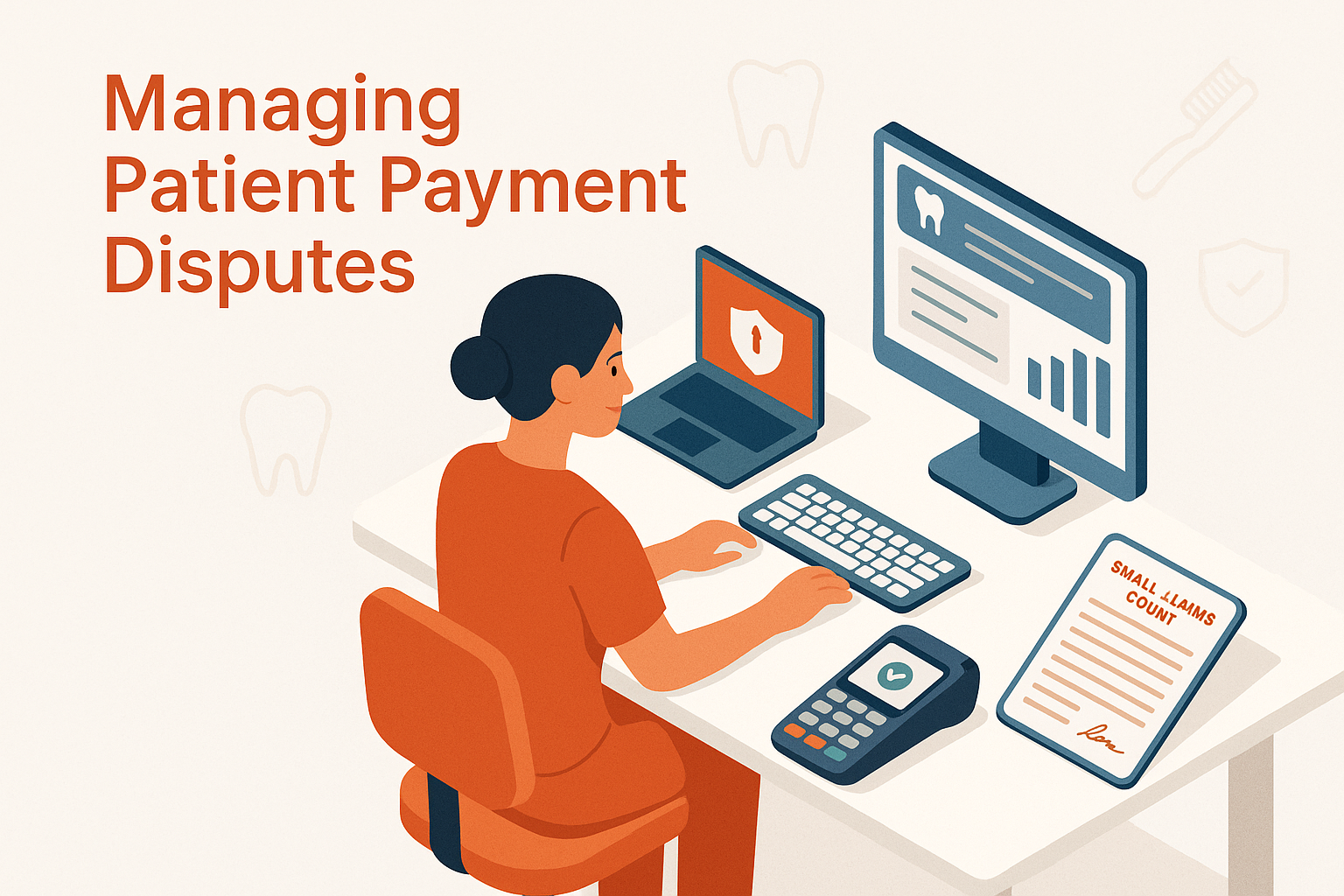The Challenges of Small Claims Court: A Dentist’s Perspective
For many dental professionals in Toronto and the Greater Toronto Area (GTA), ensuring patients receive timely, compassionate care is always the top priority. But what happens when that care is provided — and the patient refuses to pay? While uncommon, patient payment disputes can significantly impact a practice’s cash flow and time. Some dentists may consider pursuing legal action through small claims court, but this route presents a series of challenges. In this article, we’ll explore a real-world example and outline key strategies to help Canadian dentists understand their rights, mitigate risk, and protect their professional reputation.

A Case Example
In one real-life situation, a dentist received an emergency referral patient who presented with heavy decay and a fractured tooth. The clinical team promptly provided a core build-up and filling, along with a treatment plan that recommended a crown. Despite the thorough care and documentation, the patient did not return for the final crown procedure and later indicated she had chosen another provider — without settling the bill of $499.50. Multiple attempts to follow up were ignored, leaving the provider unsure of the next steps.

Key Questions for Dental Professionals
1. Is Small Claims Court the Right Path?
Small claims court is often viewed as a reasonable option for disputes under $35,000 in Ontario. However, dentists must be prepared to act as both caregiver and claimant, which can put clinical work on hold. Prior to filing a claim, ensure you’ve exhausted alternative solutions such as written demands, mediation, or working with a third-party billing agency. The Ontario Ministry of the Attorney General provides online tools for beginning a small claims submission — though navigating the legal language often requires time, documentation, and personal appearances.

2. Presenting Evidence While Maintaining Privacy
Dentists considering court action must collect supporting evidence — including treatment notes, appointment logs, consent forms, and billing records. But how do you do this while respecting patient confidentiality? While Canada doesn’t use HIPAA, Ontario law mandates adherence to Personal Health Information Protection Act (PHIPA) standards. That means evidence must be limited to only what is needed, and ideally redacted with non-essential personal identifiers removed. Always store and transport files securely, especially if sharing them digitally with tribunal officials or third-party counsel.

3. Protecting Your Reputation
While filing a small claim may seem justified, it can carry unintended consequences, such as online reviews or social media backlash. A patient who feels "attacked" legally may respond with a one-sided account. To address this, always aim to maintain a record of clear, professional communication before and after a conflict emerges. Prepare a respectful, legally vetted public response in case your clinic's name appears on rating platforms. Being proactive with reputation management can help mitigate long-term brand impact.

4. Upfront Payment Strategies
Preventing billing issues is often more effective than resolving them afterward. Adopt transparent financial policies during intake — clearly specifying that emergency or large-scale treatments require a deposit or full payment upfront. Offer secure digital or POS options like Tap, e-transfer, or credit to streamline transactions. You can also explore using dental management software or workflow tools, such as those available from EBIKO, to help track and enforce these policies.

5. Is It Worth Pursuing Legal Action?
Finally, weigh the value of the claim against the time, energy, and potential fallout it might generate. Pursuing $500 through small claims court can take several months and may still not result in collected funds — especially if the judgment can’t be enforced. Consider implementing a threshold amount above which you’ll pursue claims and below which you may write them off or use collection agencies. Keeping documentation of your internal decision-making process is helpful for future reference or defending your actions before regulators.

Conclusion & Best Practices
Handling non-payment situations as a dental professional can feel deeply personal, especially in a service field built on trust. However, understanding your financial rights, documenting policies clearly, safeguarding patient data, and preparing appropriately for potential backlash are key steps for any modern dental practice. By strengthening your payment systems and integrating tools tailored for Canadian clinics — such as patient intake technologies, digital consent platforms, or verified billing tools — you can recover both productivity and peace of mind.
At EBIKO Dental, we offer a range of products to support dental risk mitigation, from modern operatory tools to wireless POS terminal systems that streamline patient transactions. Ensuring your practice implements preventative measures today can reduce the legal and financial strain of tomorrow.


